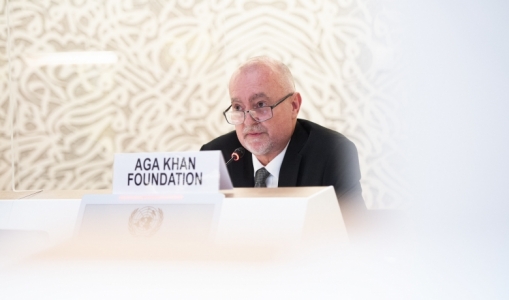AKDN Statement at the High-level Ministerial Meeting on the Humanitarian Situation in Afghanistan 2021-09-13
Excellencies, Ladies and Gentlemen,
The agencies of the Aga Khan Development Network are honoured and privileged to convey our abiding commitment to the peoples of Afghanistan.
This allegiance is enduring. It is founded on the most profound respect for Afghanistan’s many traditions and the bonds of our shared humanity. AKDN’s work and its aim of improving the quality of life of all communities it seeks to serve is premised on the ethical principles of Islam, which promote peace and harmony.
With that ideal in mind, we wish to thank the United Nations for convening the international community at this critical juncture in the country’s history.
For more than three decades, we have stood with the people of Afghanistan. We take this opportunity to reaffirm our commitment, which remains unshaken.
During this time, and today, we listen to and support people at the community level to help them realise their individual and collective aspirations for a better life – coming together to find solutions that are sustainable, acceptable and deliverable.
In the process, AKDN has provided life-saving medical treatment and healthcare to millions of mothers, fathers, sisters, and brothers; helped educate hundreds of thousands of boys and girls; built rural infrastructure including roads, bridges, and irrigation canals; assisted families in improving household incomes; helped to preserve cultural heritage; strengthened community preparedness and resilience in the face of natural disaster and climate change; and brought connectivity and enhanced communications to many corners of the country.
Our experience teaches us that determined, transparent and inclusive engagement, led and driven by Afghans in their communities, can and does succeed. Indeed, it is the only method to bring real and lasting change.
That is a lesson we urge the international community to heed, and to act with compassion and foresight. For now is the time to engage, to stay in dialogue, and to continue on the path to mutual accommodation – to establish lasting peace, opportunity and prosperity.
Now is certainly not the time to turn our back on decades of progress. Or on the two-thirds of the country under the age of 25, a generation that has grown up under the shadow of war but with determined hopes of a better life. Their dreams and aspirations remain intact in Afghanistan, and we owe them the dignity – the promise – of standing together with them and their communities as they face the future.
For conditions are dire.
As we hear today, the economic situation in Afghanistan is bad and worsening. The banking system is non-functional. Rampant unemployment is increasing. Resources are desperately needed for food, medicine, education and other essential services. Healthcare facilities in many areas may close in a matter of days, in the midst of a pandemic. 18 million people are already in extreme need, with a similar number at risk. That suggests virtually the entire country could be without adequate healthcare, without enough food, and without sufficient livelihoods.
As a long-standing partner of Afghanistan and its people, we draw attention to the need for urgent, corresponding measures:
Restoring the banking system to facilitate international transfers, allowing much-needed financial support and access to markets;
Authorising direct support without delay to the providers of healthcare and education;
Arranging robust and inclusive food aid and work programmes to stave off desperation; and
Unblocking assistance already authorised for direct support to the Afghan population, providing relief today, as well as the tools and means to reduce dependency on such relief in the future.
We join others in underscoring that these measures be taken quickly and decisively if we are to avert a sustained crisis of shocking regionally-destabilising proportions. We urge here as well that the international community not abandon Afghanistan’s longer-term development, as the consequences of doing so would be profound.
Today we require collectively focused attention on the urgency of humanitarian action. Today and going forward, our actions must be meaningfully humane.
Thank you.
- 1079 reads
 Ismaili.NET - Heritage F.I.E.L.D.
Ismaili.NET - Heritage F.I.E.L.D.